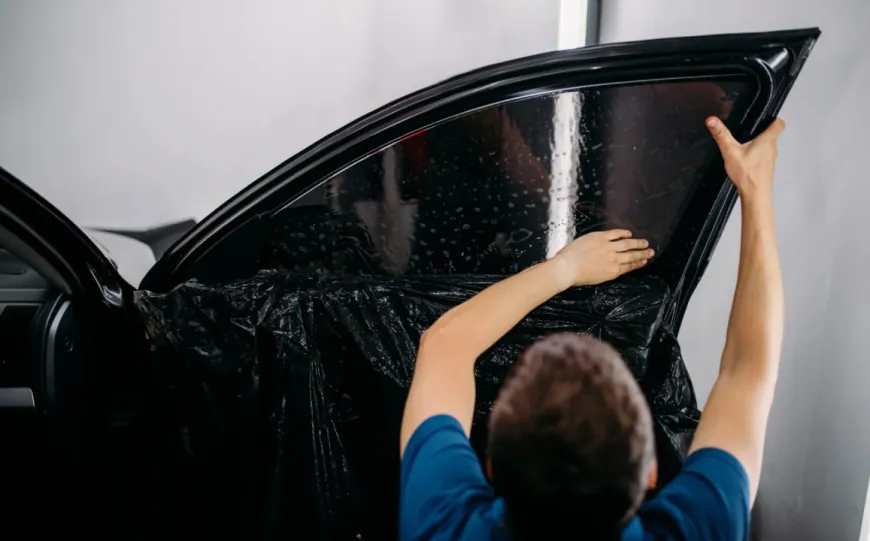Car Window Tinting: How It Can Protect Your Car and Improve Comfort
Car window tinting is more than just an aesthetic upgrade it’s a practical addition that improves comfort, enhances safety, and protects your vehicle's interior.

Introduction
Ever wondered how a simple film on your car windows can make a world of difference? Car window tinting isn't just about style; it’s an investment in comfort, protection, and even safety. In this article, we’ll explore the numerous benefits of window tinting and why it might be a smart addition to your vehicle.
What is Car Window Tinting?
Car window tinting involves applying a thin, transparent film to the glass surfaces of a vehicle. This film is made from polyester or a specialized laminate material and can come in various shades and thicknesses. Its primary purpose is to block out harmful UV rays, reduce heat, and enhance the overall comfort of the driving experience.
Types of Car Window Tinting Films
Understanding the types of window tinting films available can help you make an informed choice:
-
Dyed Window Film: Cost-effective and good for heat reduction, but not as durable as other options.
-
Metalized Film: Reflects heat and provides a high level of UV protection but can interfere with GPS and phone signals.
-
Carbon Window Tint: Offers a matte finish, excellent heat resistance, and no signal interference.
-
Ceramic Film: The best in the market, ceramic tints offer superior UV and heat rejection without compromising visibility.
Key Benefits of Car Window Tinting
UV Protection: Guarding Your Interior
Did you know that prolonged exposure to UV rays can cause fading and cracking of your car’s interior? Window tinting acts like sunscreen for your car, shielding it from up to 99% of harmful ultraviolet radiation. This not only keeps your seats and dashboard looking new but also preserves the value of your car over time.
Heat Reduction for a Cooler Ride
Stepping into a car that’s been sitting under the sun can feel like stepping into an oven. With tinted windows, the heat absorption is significantly reduced, making your car more comfortable during hot summer days. The reduction in heat can be as much as 60%, allowing you to spend less on air conditioning.
Enhanced Privacy and Security
Ever feel like you’re in a fishbowl while driving? Tinted windows offer a layer of privacy, keeping prying eyes out. Whether you're parked or on the go, window tinting makes it harder for outsiders to see valuables in your car, thus deterring potential thieves.
Glare Reduction for Better Visibility
Sun glare isn’t just annoying; it’s dangerous. It can temporarily blind drivers, increasing the risk of accidents. Car window tinting reduces glare from the sun and other sources, such as headlights from other vehicles, helping you drive safely, especially during early mornings and late afternoons.
Protecting Passengers’ Skin
Skin cancer and other sun-related issues are not limited to outdoor exposure. When you’re driving, you’re still at risk from UV rays. High-quality window tints block these rays, offering an added layer of protection for you and your passengers’ skin.
Increased Energy Efficiency
Tinted windows can contribute to better fuel efficiency. By keeping your car cooler, the demand on your car’s air conditioning system decreases, leading to less fuel consumption. This can result in long-term savings on gas and maintenance.
Does Tinting Affect Driving at Night?
A common concern is whether tinted windows reduce visibility at night. High-quality tints, especially those that are ceramic or carbon-based, are designed to maintain clarity and visibility, even after the sun sets. It’s essential to choose the right tint level that balances daytime heat rejection and nighttime visibility.
Legal Regulations for Car Tinting
Different regions have different laws regarding window tinting. It’s crucial to check local regulations to ensure that your chosen tint level is compliant. Some areas have strict rules on how dark the tint can be, so knowing the law can save you from fines and the hassle of having to remove the film.
Choosing the Right Tint for Your Car
Not all tints are created equal, and your choice should depend on your needs and budget. If you're primarily looking for UV protection, a basic dyed film might suffice. However, for better durability and heat rejection, investing in a ceramic or carbon tint is recommended.
How to Maintain Your Tinted Windows
Maintaining tinted windows is simple. Use non-ammonia-based cleaners and a soft cloth to clean the surface. This helps maintain the integrity of the film and ensures it lasts longer without peeling or discoloration.
Conclusion
Car window tinting is more than just an aesthetic upgrade it’s a practical addition that improves comfort, enhances safety, and protects your vehicle's interior. From blocking harmful UV rays to reducing glare and heat, the benefits are worth considering.












